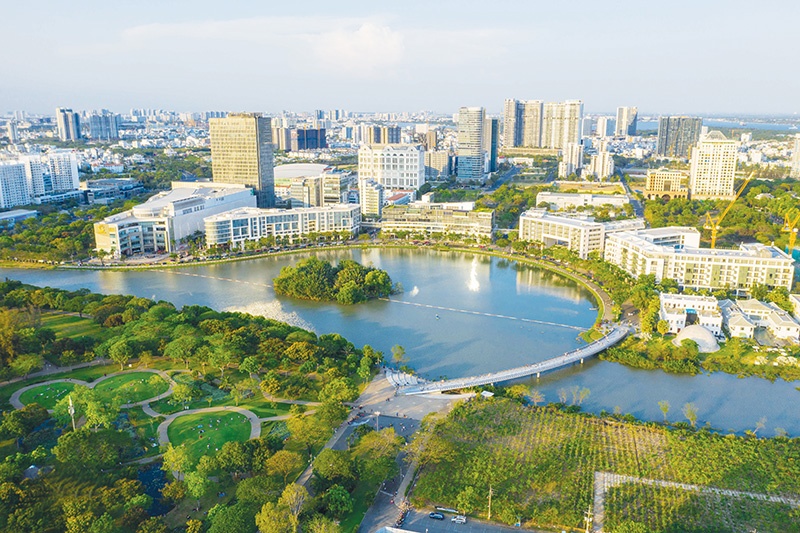Stimulus plan brings property positivity
 |
| Photo Le Toan |
In December at a seminar on the real estate market, Tran Hong Phuc, general director of Phuc Hung Holdings Construction JSC, said that a new government stimulus package would create more jobs and opportunities for the business community when officially put into operation. “The economy will develop better and this will reflect back to every company and create more favourable conditions for business to recover,” Phuc said.
The $15 billion stimulus package, or 3.2 per cent of GDP, approved by the National Assembly in January, will focus on socioeconomic development to foster recovery. Around $7.6 billion from this package will be poured into investment and development, mainly for infrastructure improvements.
“The stimulus package will promote public investment, so to be effective, the compensation and clearance work must be implemented quickly. When the stimulus package is launched, investment activities will be more drastic,” Phuc emphasised.
The real estate and banking sectors are still the focus of investors, with many stocks continuously increasing. Vietnam is also pursuing an economic recovery strategy similar to many other economies.
Accordingly, the package for 2022-2023 includes four component programmes, some of which will affect real estate and building materials: the master plan on opening up the economy associated with COVID-19 prevention and control; one on social security and employment; one to restore enterprises, cooperatives, and business households; and another to develop infrastructure and unlock social resources.
The new adjusted capital and share purchases by foreign investors reached $31.15 billion as of December 20, up 9.2 per cent annually, in which real estate ranked third with $2.6 billion. This figure shows that despite the strong impact of the pandemic, Vietnam is still an attractive destination for foreign direct investment (FDI), as reported by the Foreign Investment Agency.
Previous reports by several market research consultants also stated that foreign investors still carried out many mergers and acquisitions in housing projects and industrial real estate. The largest manufacturing plants in the first half of 2021 in Quang Ninh and Bac Giang provinces were mostly funded by Hong Kong and Singaporean investors.
The context of the pandemic has allowed many foreign investors to solve the problem of the scarcity of clean land and the continuously escalating land prices for the past three years. They are very active in cooperating with domestic real estate corporations in large-scale projects.
In addition, foreign investors highly appreciate the foundations in Vietnam, such as labour, the fast and robust development of infrastructure in big cities, and the government’s supportive policies for enterprises. These have created attractive investment opportunities that caused foreign capital to flow in. At the same time, when the economy gradually recovers, good planning, developed infrastructure, a golden population structure, and middle class growth will be a significant driving force for the real estate market, the experts insist.
According to property consultants Savills Hong Kong, Vietnam remains an attractive investment destination for overseas investors in particular as the world attempts to open back up. In the complicated movements of the pandemic, Vietnam is the only country in the world to be upgraded to a positive rating by Moody’s, S&P, and Fitch.
Meanwhile, Pham Lam, deputy chairman of the Vietnam Association of Realtors (VARS), said that the pandemic is an opportunity for real estate businesses to review their activities, product quality, development capacity, and how to be able to offer reasonable prices for end-users.
Figures from the VARS show that a huge number of related businesses had to close for some time due to the impacts stemming from the pandemic. However, many Vietnamese businesses are showing perseverance and persistence with development model changes and accelerating the digitisation process in operations. Many businesses have actively participated with local authorities in fighting the pandemic, such as Vingroup, Hung Thinh Group, Dai Phuc Group, and many others.
Ho Chi Minh City, meanwhile, is to set up one million units for lower-income people. “This is not only an opportunity for developers to benefit, but also to show their responsibility to society,” said Lam from the VARS.
| Edwin Tan - Deputy CEO Frasers Property Vietnam
In real estate, developers are increasingly focused on sustainability. For example, Frasers Property has committed to net zero carbon by 2050 with green initiatives, materials, construction, and developing techniques. Real estate has traditionally been slower to integrate technology than other industries. However, it has shown signs of quickly catching up in recent decades. The selling price in the residential segment is expected to see upward pressure due to the general cost increase. Land prices are likely to continue to rise not only in Ho Chi Minh City and Hanoi, but also in the key provincial markets, owing to the significant growth of the industrial sector and people returning home during pandemic peaks. With the lack of good quality office space in Ho Chi Minh City, foreign investment growth will continue to support demand, especially Grade A offices in central business districts. The decentralisation trend will continue to be emphasised due to upward pressure on rentals. Moreover, the impact of hybrid working models has started to reshape office policies. Vietnam’s industrial and logistics market will be firmly supported by many new industrial zones being approved in many provinces. | |
| Eddie Lim - CEO, Viva Land
Incredibly, some segments are expected to become bright spots to accelerate market growth in 2022 and beyond thanks to flexible responses. In this situation, the National Housing Development Strategy for 2021-2030 will strongly support such a trend apart from the proposed economic stimulus package worth many trillions of VND. Accordingly, the economy is boosted by the government’s substantial support packages, leading to bright prospects for property market. In addition, the housing development strategy is expected to create conditions for everyone to have a place to live and focus on improving quality, as well as implementing the trend of green and smart housing development in the post-pandemic period, targeting sustainable real estate market development. Sustainable and innovative developments are also what Viva Land is keen on. Founded in 2020, Viva Land aims at creating best-in-class, green, and sustainable spaces for generations and communities to prosper. We believe we can greatly contribute to the aforementioned trend of Vietnam’s real estate market as our vision is to become a resilient company that delivers excellent services and crafts best-in-class urban spaces. | |
| Jack Nguyen - Senior management investment consultant
The Vietnamese government’s recent announcement of an economic stimulus package and additional investments for the decade is good news. The real estate sector itself has remained resilient throughout the past two years with property and land prices maintaining their value and, in many cases, continuing to show appreciation. The expected bounce back in the economy, combined with the planned reopening of Vietnam to foreign visitors, will contribute to the country’s real estate development at levels of pre-pandemic days. Specifically, the land demand in the industrial zones continues to lead the trend. Recent reports of industrial land in Ho Chi Minh City and surrounding areas running out of space will push land demands in neighbouring provinces. Investors continue to look for land to build industrial zones, a trend that will continue in 2022 and beyond. The demand for residential properties will continue, particularly in the affordable segment of the market. Developers will also look to build condo properties on the outskirts of Ho Chi Minh City as land prices and building costs will push developments further away from the city. |
What the stars mean:
★ Poor ★ ★ Promising ★★★ Good ★★★★ Very good ★★★★★ Exceptional
Related Contents
Latest News
More News
- An Phat 5 Industrial Park targets ESG-driven investors in Hai Phong (January 26, 2026 | 08:30)
- Decree opens incentives for green urban development (January 24, 2026 | 11:18)
- Public investment is reshaping real estate’s role in Vietnam (January 21, 2026 | 10:04)
- Ho Chi Minh City seeks investor to revive Binh Quoi–Thanh Da project (January 19, 2026 | 11:58)
- Sun Group launches construction of Rach Chiec sports complex (January 16, 2026 | 16:17)
- CEO Group breaks ground on first industrial park in Haiphong Free Trade Zone (January 15, 2026 | 15:47)
- BRIGHTPARK Entertainment Complex opens in Ninh Binh (January 12, 2026 | 14:27)
- Ho Chi Minh City's industrial parks top $5.3 billion investment in 2025 (January 06, 2026 | 08:38)
- Why Vietnam must build a global strategy for its construction industry (December 31, 2025 | 18:57)
- Housing operations must be effective (December 29, 2025 | 10:00)




 Tag:
Tag:



















 Mobile Version
Mobile Version